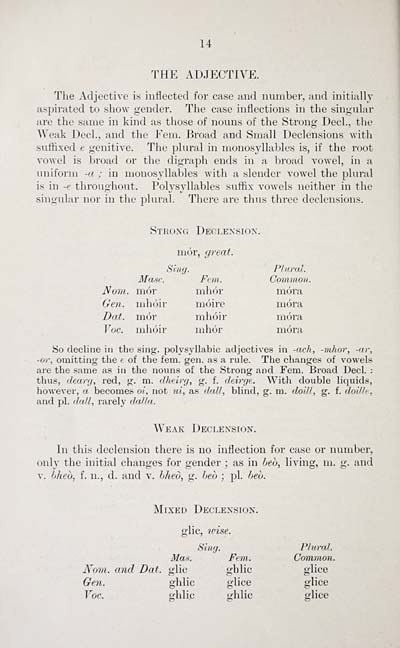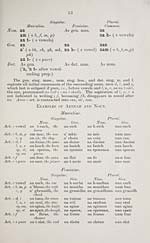Download files
Complete book:
Individual page:
Thumbnail gallery: Grid view | List view

14
THE ADJECTIVE.
The Adjective is inflected for case and number, and initially
aspirated to show gender. The case inflections in the singular
are the same in kind as those of nouns of the Strong Decl., the
AVeak Deck, and the Fem. Broad and Small Declensions with
sutìixed e genitive. The plural in monosyllables is, if the root
vowel is broad or the digraph ends in a broad vowel, in a
iniiform -a ; in monosyllables with a slender vowel the plural
is in -(?• throughout. Polysyllables suftix vowels neither in the
sinuular nor in the plural. There are thus three declensions.
Stroxg Deoi.exsiox.
So decline in the sing, polysyllabic adjectives in -acli, -mhor, -ar,
-or, omitting the '■ of the fem. gen. as a rule. The changes of vowels
are the same as in the nouns of the Strong and Fem. Broad Decl. :
thus, deary, red, g. m. dheiry, g. f. deirge. With double liquids,
however, a becomes oi, not tii, as dal/, blind, g. m. doi/i, g. f. doif/c,
and pi. dad, rarely dalla.
Weak Declexsion.
In this declension there is no inflection for case or number,
only the initial changes for gender ; as in heb, living, m. g. and
V. hheb, f. n., d. and v. l)heò, g. heo ; pi. heb.
THE ADJECTIVE.
The Adjective is inflected for case and number, and initially
aspirated to show gender. The case inflections in the singular
are the same in kind as those of nouns of the Strong Decl., the
AVeak Deck, and the Fem. Broad and Small Declensions with
sutìixed e genitive. The plural in monosyllables is, if the root
vowel is broad or the digraph ends in a broad vowel, in a
iniiform -a ; in monosyllables with a slender vowel the plural
is in -(?• throughout. Polysyllables suftix vowels neither in the
sinuular nor in the plural. There are thus three declensions.
Stroxg Deoi.exsiox.
So decline in the sing, polysyllabic adjectives in -acli, -mhor, -ar,
-or, omitting the '■ of the fem. gen. as a rule. The changes of vowels
are the same as in the nouns of the Strong and Fem. Broad Decl. :
thus, deary, red, g. m. dheiry, g. f. deirge. With double liquids,
however, a becomes oi, not tii, as dal/, blind, g. m. doi/i, g. f. doif/c,
and pi. dad, rarely dalla.
Weak Declexsion.
In this declension there is no inflection for case or number,
only the initial changes for gender ; as in heb, living, m. g. and
V. hheb, f. n., d. and v. l)heò, g. heo ; pi. heb.
Set display mode to: Large image | Transcription
Images and transcriptions on this page, including medium image downloads, may be used under the Creative Commons Attribution 4.0 International Licence unless otherwise stated. ![]()
| Early Gaelic Book Collections > Hew Morrison Collection > How to learn Gaelic > (26) |
|---|
| Permanent URL | https://digital.nls.uk/79790451 |
|---|
| Description | A selection of items from a collection of 320 volumes and 30 pamphlets of literary and religious works in Scottish Gaelic. From the personal library of Hew Morrison, the first City Librarian of Edinburgh. |
|---|
| Description | Selected items from five 'Special and Named Printed Collections'. Includes books in Gaelic and other Celtic languages, works about the Gaels, their languages, literature, culture and history. |
|---|

